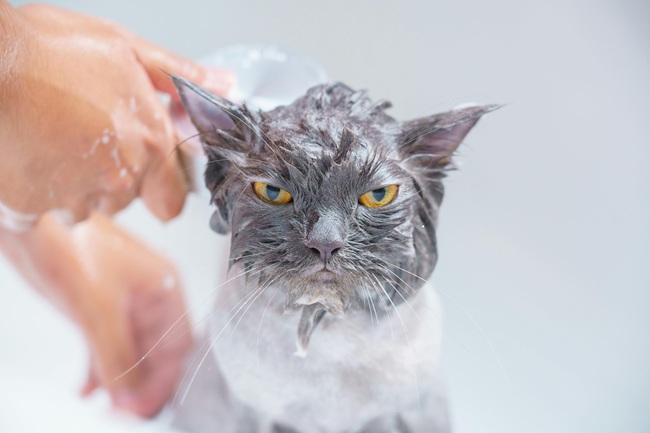
As a rule, only bathe a cat if he’s very dirty or if he has a disease that requires bathing. If you must bathe him, use a gentle shampoo, and always bathe the cat in a well-heated room, in a tub of lukewarm water (about 86° Fahrenheit). Be gentle and never scare him by running water on him or spraying him with it. Scoop the water over him, never wetting his head, and always rub him dry with a prewarmed towel (pop a large fluffy towel into the dryer for a few minutes). Some cats don’t object to a hairdryer, though make sure the dryer is on its lowest setting.
Why do Kittens Born in the Same Litter Look So Different and More?
Kittens in the same look very different, because they more than likely had a different father. One of the more bizarre biological attributes of a female cat is that she can get into heat while she’s already pregnant. In fact, her ovaries are stimulated to release more eggs as soon as one male partner withdraws. So, a single litter of kittens can have more than one father. Mating isn’t exactly a romantic affair for cats – the whole process only takes a few seconds. Once a male cat has finished, the female will wait for another tom to approach her. Depending on the neighborhood, one roaming tom after another will mate with a female. After that, it’s anyone’s guess whose sperm fertilized which egg. She can even carry two litters at the same time at two different stages of development.
Why do Cats Hate Water?
Considering that cats evolved practically as desert animals in climates that were very dry, it’s not surprising that they aren’t overly fond of water. There just wasn’t very much water around. In reality, though, virtually any cat who has been exposed to water since kittenhood may enjoy it and may even delight in taking the occasional bath. Cats are also natural swimmers. Certain breeds do seem to like water more than others. Abyssinians have been known to join their owners in the shower. The Van cat, rare outside his native Turkey, loves to swim. Turkish angoras and Manxes also enjoy water. A wild cat, known as “the fishing cat,” may be the most unique. This one will swim to catch fish. Called the Bengali Mach-Bagral, nature gave him extra-long claws, which he uses like fishhooks to spear them. This fishing cat is found in Nepal, Burma, Southern China, and parts of India.
Why are Kittens Born With Their Eyes Closed?
All kittens are born blind, and their eyes remain closed as a protective measure until this delicate sense begins to develop. Incidentally, they are also born deaf. Since the cat’s perfect balance requires a combo of eye and ear messages, the tiny kitten’s righting reflex isn’t fully operational until his eyes open. Kittens will begin to open their eyes 5 – 10 days after they are born, then their eyes open fully between eight and 20 days. Once their eyes open, kittens will have to learn how to handle all these skills until they’re approximately 12 weeks old. Their sense of smell, though, is well-developed from day one. Even at birth, certain behaviors are instinctive. If you hold your finger up to a newborn kitten’s nose, for example, he’ll hiss or spit if he feels disturbed. At birth, all kittens’ eyes are blue/gray; they get their permanent eye color at about 12 weeks.
Why do Cats Walk the Way They Do?
A cat walks the way he does because it’s best suited for a skillful hunter. Almost all animals walk by moving alternate legs – first the left front and right rear, then the right front and left rear. Only three animals walk by moving the two legs on one side together first, then shifting to do the same on the other side: the giraffe, the camel, and the cat. This method of walking, which is basically diagonal, uses a minimum of energy and helps ensure speed, agility, and silence.
How Long Can a Cat Go Without Food or Water?
A cat can survive without food much longer than humans can. He can lose as much as 40 percent of his body weight and survive. Water, though, is entirely a different matter. A 10 to 14 percent loss of the total water in a cat’s body is fatal.
Related Articles & Free Email Newsletter Sign Up
Everyday Items That Can Harm Your Cat
How to Prevent and Eliminate Hairballs in Cats


Comment here